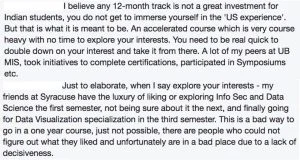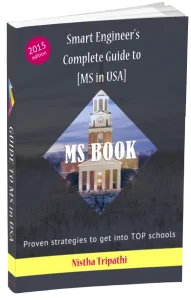Let us discuss the pros and cons of each and decide whether you should apply for one-year or two-year MS programs. Most of the thesis based courses are two years. Only if you wish to return to industry, some universities offer one-year fast track MS programs. One year programs are more usual in professional programs such as MIS/MEM and MBA.
Popular one year Master’s degrees
| S No. | University | Program Name |
|---|---|---|
| 1 | Cornell | MEng in CS, EE and others |
| 2 | University of Chicago | MPCS |
| 3 | CMU | MISM |
| 4 | UT Austin | MS Business Analytics |
| 5 | Columbia | MFE |
| 6 | University of Washington | MSIS |
| 7 | Indiana University, Bloomington | MIS |
| 8 | MIT Sloan One year track | MBA |
| 9 | Cornell Johnson One year track | MBA |
| 10 | Kellogg One year track | MBA |
By program-
MIS/MEM – CMU 12 month MISM, Washington MSIS, U Buffalo MIS, Duke MEM, Indiana University, Bloomington
MS – Cornell MEng, MPCS (Masters Program in Computer Science) at U of Chicago
Business Analytics – UT Austin, Georgia Tech, UIC
MFE – Berkeley, Columbia, UCLA
MBA – INSEAD, London Business School, Kellogg one year track, Cornell Johnson one year track, MIT Sloan one year track, ISB
One-year or two-year MS
One year programs are more intensive whereas two-year programs space out the curriculum at a more breathable pace. Time flies by in graduate school and one-year duration means that before you know it, the job hunt is on and you are about to graduate. Two-year programs are obviously more immersive and give you a chance to experience the culture, location and build better relations. One year programs do not have time for summer internships.
One year programs typically admit people with higher work experience and proven quantitative aptitude so that they can handle the coursework intensity. A portion of the folks in one-year programs come from companies which as sponsoring their studies (e.g. Washington MSIS).
When should you choose one year program?
Just looking for a degree? One-year programs are your savior!
If you are clear on your goals (and are not looking for a drastic career change), one year program can save you one year of opportunity cost, which can be huge! Most of the students pursue MS to get into campus placements and one-year programs still offer you that without the extra fee and extra year of lost employment. Secondly, if your company is sponsoring you, then they might prefer that you finish the degree sooner.
When should you choose a two-year MS over one-year program?
If you have less than three years of work experience and want to explore different options before choosing your fulltime employer, then go for a longer program. This will allow you to take more courses, do more networking and do a summer internship.
If you are a higher work-ex candidate but wish to do a career change, go for a two-year program so that you can get a summer internship – which is a great way of trying out a role without committing to it.
Word of advice
In an interesting discussion in our closed Facebook group of only our clients, we were arguing what works better. I am posting some interesting comments from it-

Conclusion
At the end, it can be a tricky call. I have worked with freshers who chose a ten-month program and >10 years experienced professional who chose a two-year program. Eventually, it is about understanding what you need at this juncture of your career. In our counseling, we address such doubts and help you pick what is right for you.



No comment yet, add your voice below!